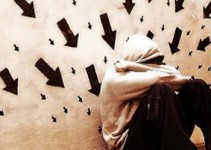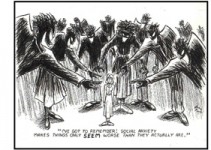Everyone gets to feel that stress when meeting someone or some people for the first time. Some people feel the pressure of knowing what to say, and the right way to act, but how does one really know that what he or she is feeling is beyond the normal nervousness of meeting a crowd?
Social anxiety is something that is common to those who have low self esteem. In the medical context, social anxiety is also called social phobia and it is an anxiety disorder where an individual has irrational fear of social situations. For people who have social anxiety, meeting people for the first time or working in close supervision may bring an intense feeling of anxiety as they have issues on how other people will accept them.
It is really difficult to tell exactly how a person develops social anxiety disorder within their system, because it may vary according to the person’s past experiences and the manner on how they were raised in their homes. Sometimes, people who middle siblings also have a higher chance of developing social anxiety disorder. Sometimes, it takes a very embarrassing situation for a person to develop social anxiety disorder.
People with social anxiety disorder get their anxiety attacks with different situations such as meeting new people, being the center of attention, being watched while doing something, making small talk, public speaking, performing on stage, being teased, being criticized, talking with people of authority, being asked to recite in front of a class, going on a date, making phone call, using public comfort rooms, taking exams, eating in public, and sharing their thoughts in meetings.
People with social anxiety disorder may have different emotional and physical symptoms. The emotional symptoms can exhibit excessive self consciousness, intense worry and anxiety days before and upcoming social situation, extreme fear of being watched, fear of embarrassment or self humiliation, fear that other people will pick up on his or her own nervousness. There are also physical symptoms which are blushing, shortness of breath, upset stomach, trembling or shaking, chest tightness, hot flashes or feeling dizzy or having faint spells.
There are also behavioral symptoms that confirm that someone has social anxiety disorder and these are avoiding social situations in a way that it affects your life as you do not talk to other people anymore, avoiding attention and hiding in the background in order to avoid being noticed, always asking for a buddy to accompany him or her wherever he goes and sometimes drinking before going to social situations.
If you notice social anxiety disorder on someone you know, of if you feel that you may have social anxiety disorder, and then you do not need to be in despair. There are ways to bring back the confidence that you once had. The first thing that you can do is challenge negative thoughts. Just remember that it’s all in the head. When you start feeling the anxiety coming on, focus on heavy breathing. You can do this on a spare room or in the comfort room. Do this until you feel the dizziness slowly fade away. Another good thing to do is to remind yourself that you can do things that others cannot do, and that you are unique. This is to reinforce a feeling of confidence. Also, remind yourself not to be overly conscious about yourself, as the other people that you are meeting are also busy thinking of what the other people are thinking about them!
Social anxiety disorder can limit your true capabilities, so practice socializing with others on a regular basis to develop your potentials further.

